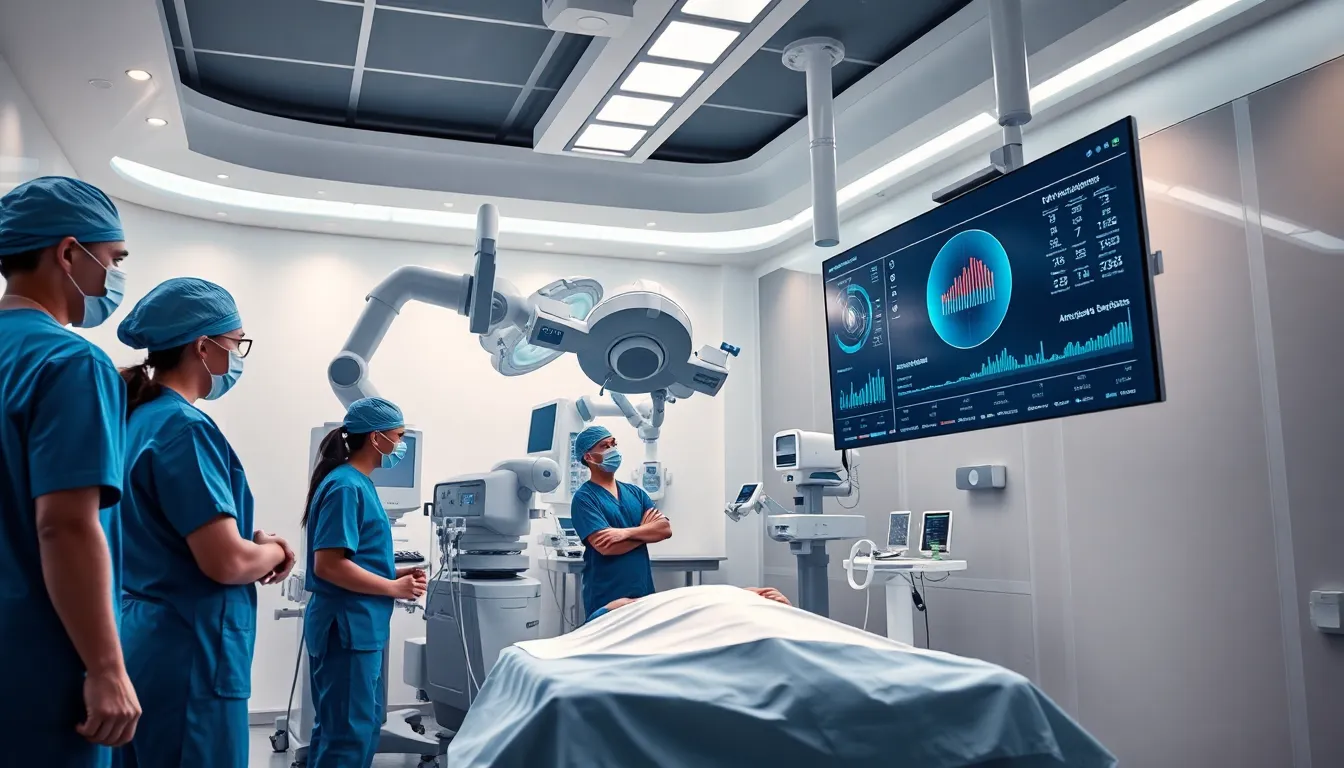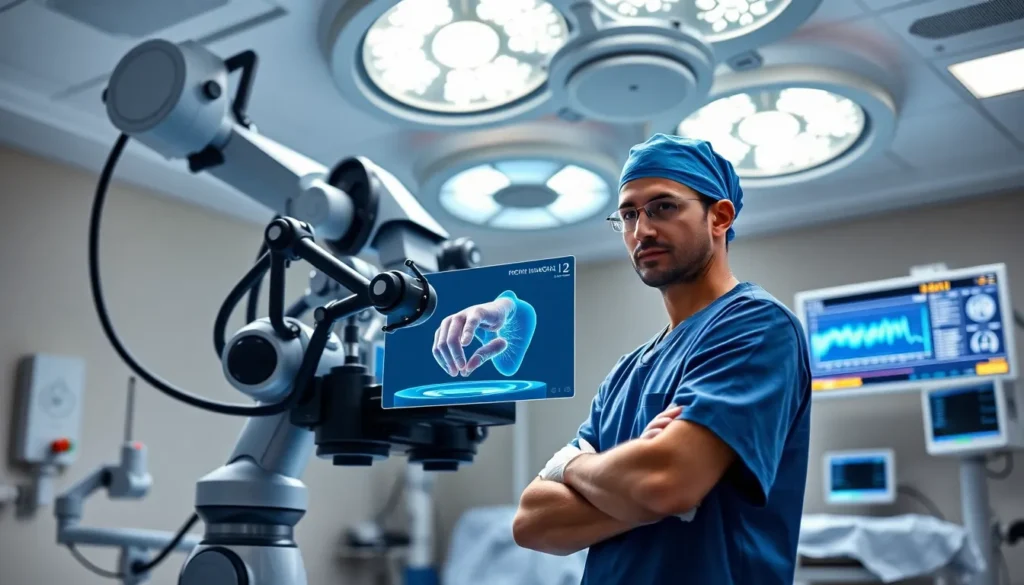Table of Contents
ToggleImagine a world where doctors are assisted by robots in the operating room, ensuring precision down to the last millimeter. It’s not a sci-fi movie: it’s the future of medical surgery. Artificial intelligence surgery is rapidly becoming a game-changer in healthcare, enhancing outcomes and reducing errors. But before you start picturing a robot with a scalpel, let’s jump into what AI in surgery truly means and why it matters. This isn’t just an upgrade: it’s a surgical revolution.
Overview of Artificial Intelligence in Medicine

Artificial intelligence is transforming medicine, particularly in surgery, by enhancing decision-making, improving diagnostics, and streamlining operations. Remarkably, AI algorithms analyze vast amounts of data from medical records, imaging, and research to provide insights into patient care that were previously unavailable. Imagine a surgical diagnosis system that learns and improves over time, adapting to new data and refining its recommendations. With machine learning and deep learning at the forefront, AI is not merely a tool: it’s a partner in the surgical suite, making procedures safer and more efficient.
The integration of AI in medicine marks a significant paradigm shift, where human expertise merges with machine precision. By recognizing patterns and predicting potential complications, AI enhances the surgical experience, giving surgeons the ability to focus on what they do best, operating.
Technological Advances Driving AI in Surgery
Several innovative technologies are propelling the integration of AI into surgical practices. First, robotic systems equipped with AI capabilities can perform intricate surgeries with unparalleled precision. Technologies like the da Vinci Surgical System exemplify how robots can assist surgeons, minimizing invasiveness and enhancing recovery times.
Also, imaging advancements, such as 3D imaging and augmented reality, allow for better visualization of surgical sites. These technologies offer surgeons detailed perspectives, including vital structures and anomalies, before they even begin the procedure. Machine learning algorithms analyze these images to highlight risks and suggest optimal surgical approaches, providing data-backed recommendations.
Finally, data analytics is crucial. With health records transitioning to electronic formats, vast amounts of data are now available for analysis. AI systems can sift through this data, identifying trends and patient outcomes that inform future surgical techniques and protocols. Advances in these areas are paving the way for a new era in surgical practices.
Benefits of AI-Assisted Surgery
The benefits of AI-assisted surgery are manifold. One significant advantage includes improved accuracy. Surgeons using AI tools have demonstrated greater precision during operations, leading to fewer complications and shorter recovery times for patients. The data-driven insights provided by AI support surgical teams in making informed decisions, even during challenging procedures.
Patient safety also sees an enhancement with AI technology. Algorithms monitor vital signs and other indicators in real-time, alerting teams to any potential issues before they escalate. This proactive approach minimizes risks, ensuring that patient safety is prioritized.
Also, the efficiency of surgical procedures can be significantly increased. AI tools can manage and analyze data quicker than a human, facilitating faster decision-making processes. This speed is crucial in emergency situations and can be the difference between life and death. Besides, the reduced time in surgery often translates to lower healthcare costs, making it an attractive solution for hospitals.
Challenges and Concerns of AI in Surgical Procedures
Even though the promising outlook, integrating AI in surgery isn’t without challenges. One primary concern is the issue of accountability. If an AI system makes a mistake, determining who is responsible, the surgeon, the institution, or the software developer, can be complex. This ambiguity raises ethical and legal questions that the medical community needs to address.
Data privacy is another critical issue. The vast amounts of data required to train AI systems must be handled sensitively to protect patient confidentiality. Ensuring compliance with regulations like HIPAA is essential, and any breaches can lead to serious legal ramifications.
Finally, the reliance on technology may lead to reduced surgical skills among physicians. While AI can assist, it is crucial that surgeons maintain a high level of expertise and not become overly dependent on automated systems. Striking the right balance between AI assistance and human skill is vital in maintaining the integrity of surgical practices.
Future Trends in AI Surgery
Looking ahead, the future of AI in surgery is bright, with ongoing research and development promising even more significant advancements. One exciting trend is the growth of personalized surgery. As genetics plays an increased role in healthcare, AI systems are being developed to tailor surgical plans based on an individual’s genetic makeup. This could lead to enhanced recovery outcomes and a better patient experience overall.
Besides, the expansion of telemedicine integrates AI capabilities into remote surgical procedures. Surgeons can leverage AI tools to assist with operations miles away from the patient, significantly broadening access to specialized surgical care for underserved areas.
Finally, as AI continues to evolve, we can expect more robust predictive analytics. These tools will not only assist during surgery but will also analyze post-operative data to enhance future procedures. Continuous improvement cycles driven by AI will evolve surgical techniques and practices around the world.
Case Studies and Real-World Applications
Real-world applications of AI in surgery already illustrate its impact. For instance, a renowned hospital implemented AI-assisted diagnostics and treatment protocols for complex surgeries. In a recent study, patients undergoing these AI-guided procedures experienced a 30% reduction in complications compared to traditional methods, a remarkable testament to AI’s capabilities.
Another noteworthy case involves a barometer for surgical success rates developed by a leading tech firm. This AI tool aggregates outcomes from thousands of surgeries, allowing hospitals to benchmark their performance against national averages. Such analytics empower institutions to drive improvements and ensure high-quality care.
Also, AI is making strides in minimally invasive surgery, providing unprecedented control and precision. For example, robotic systems with integrated AI have been shown to outperform conventional techniques in various procedures, such as prostatectomies and cardiac surgeries, leading to faster recovery and reduced pain for patients.






